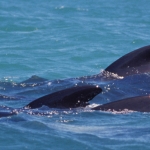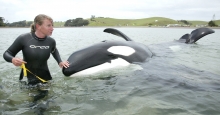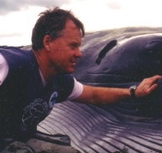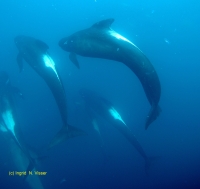
Farewell Spit is a long shallow sand spit protruding out from the South Island. It forms a large shallow area which is notorious for its mass strandings of pilot whales. Over 200 whales stranded or near stranded themselves over a three day period with many being rescued.
Initially between 90-105 pilot whales stranded along Farewell Spit on the morning of the 8th of November 1993. Among the group were neonate calves thought to be less than two weeks old. At first it was thought that the whales might be taken to the northern side of Farewell Spit and released out directly into deep water – however the surf was too rough for this to be attempted. Therefore, a digger was used on the Golden Bay (eastern) side of the Spit to construct a channel in the sand. This would bring water in faster and deeper to the awaiting whales, and thereby allow the rescuers to manoeuvre the whales out into the Bay sooner than the shallow returning tide would allow.
By 1745 hours all those whales still alive (approximately half) were successfully refloated and released. However a strong south-westerly wind prevented boats being used to help guide the whales out into the deeper waters in the middle of Golden Bay. Once released the whales conversed onto each other and spent a considerable amount of time in tactile contact before all slowly heading out to sea.
Department of Conservation sent up a small plane to locate the whales and ensure that they didn't restrand. They were sighted near the entrance of Golden Bay, conintuing to head out to sea.
Note that the second pilot whale stranding on the 8th of November 1993 was no doubt linked to this initial one, however the whales were clearly not the same individuals based on timing of release and stranding of second group.
On the 16th of November a group of approximately 60 pilot whales approached the shallow waters of Farewell Spit. The DoC sent out boats to attempt to herd them out to sea, which was successfully achieved. A second pod, of approximately 15 pilot whales came close to the beach at Paton’s Rock, the site of the stranding on the 9th of November. These too were successfully herded out to sea.
Quick Facts
| Name | Pilot whale, long-finned |
| Image |
|
| Suborder | Odontoceti |
| Family | Delphinidae |
| Max. size - Male | 6.7 m (21.9 ft) |
| Max. size - Female | 5.7 m (18.7 ft) |
| Calf size | 1.7-1.8 m (5.5-5.9 ft) |
| Max. weight - Male | 2,300 kg |
| Max. weight - Female | 1,300 kg |
| Calf weight | 75 kg |
| Food | primary food is squid, but known to take fish |
| Latin name | Globicephala melas |
| Location |
Farewell Spit, South Island |
| Latitude |
-40.51826 |
| Longitude |
172.77308 |
| Number of Whales |
90-105 |
| Number rescued/saved |
45 |
At this rescue

Ingrid has attended numerous mass and individual strandings. She is experienced in sampling and data collection at these events, and in the use of refloatation Rescue Pontoons and other rescue equipment. She has served on the Board and was a trainer for another stranding rescue group.
Read more ››

From a background as the NZ Whale Rescue Coordinator and a Fisheries Officer, Steve went on to design and implement both the Marine Mammal Medic (MMM) course, including full procedure manuals and the Whale Rescue Refloatation Pontoon System in the 1980s. Originally designed to train DoC staff and authorities in effective whale rescue techniques, Steve later redeveloped the MMM course for the layperson.
Read more ››



